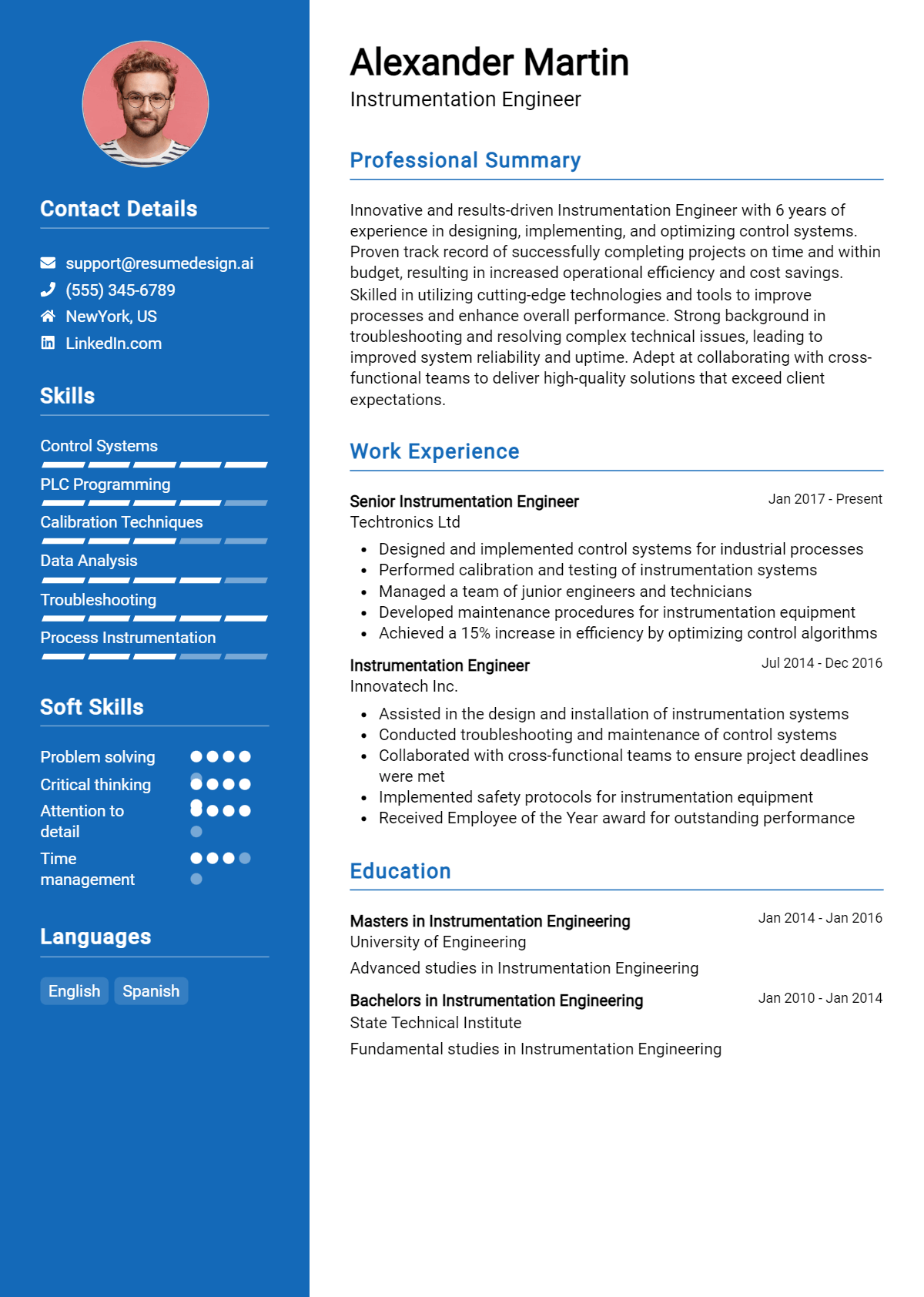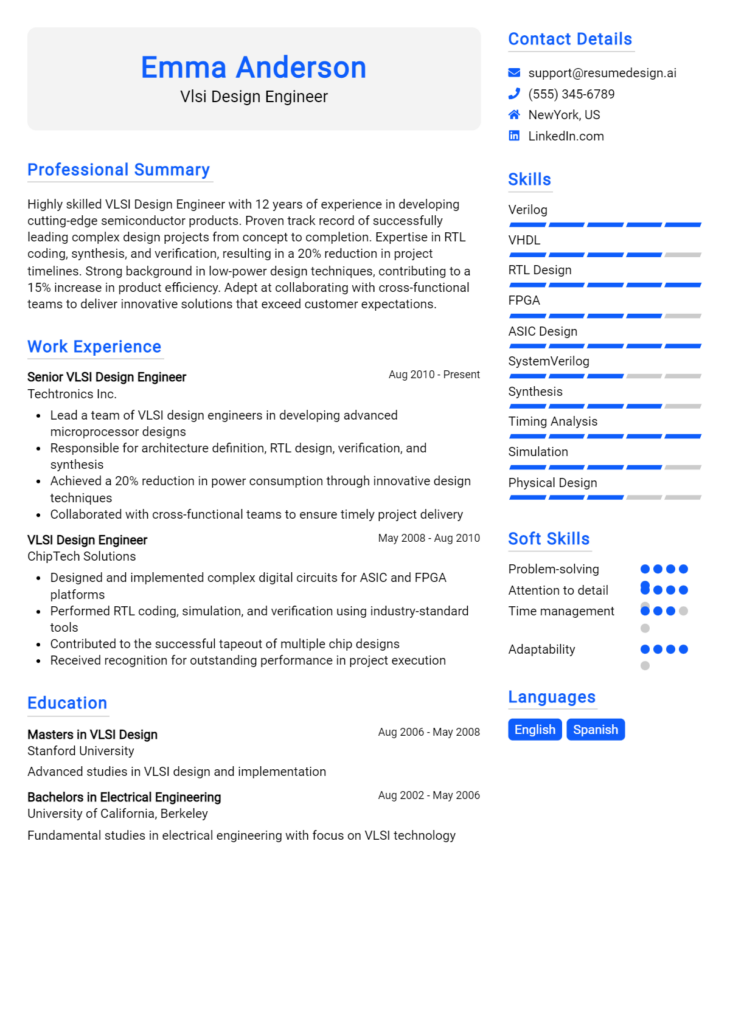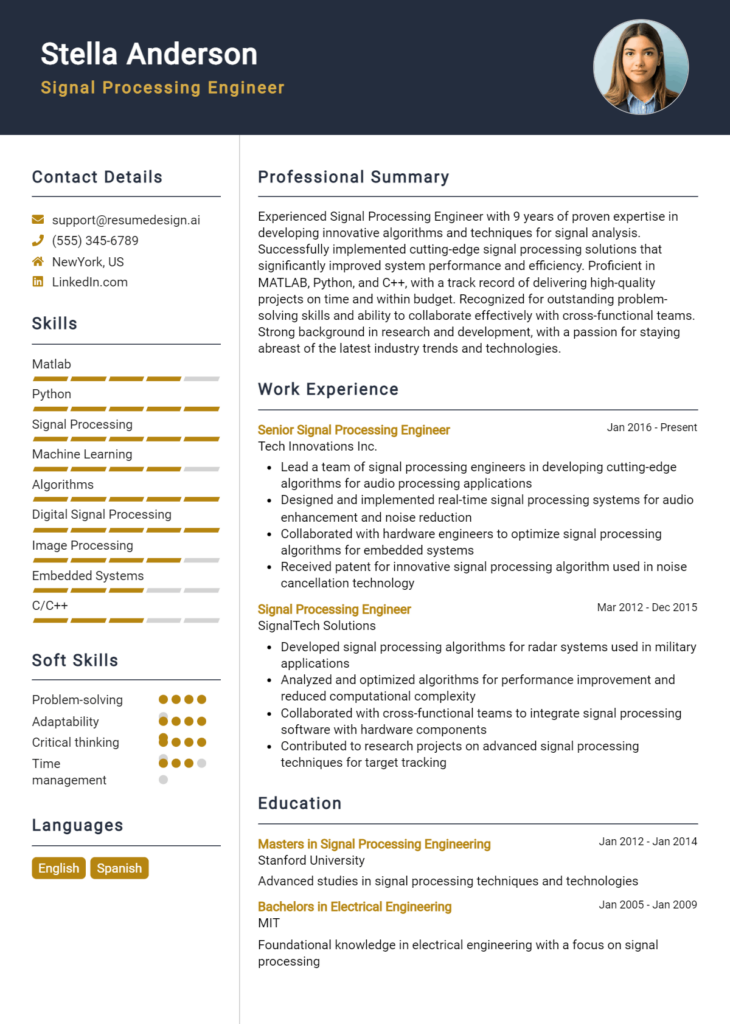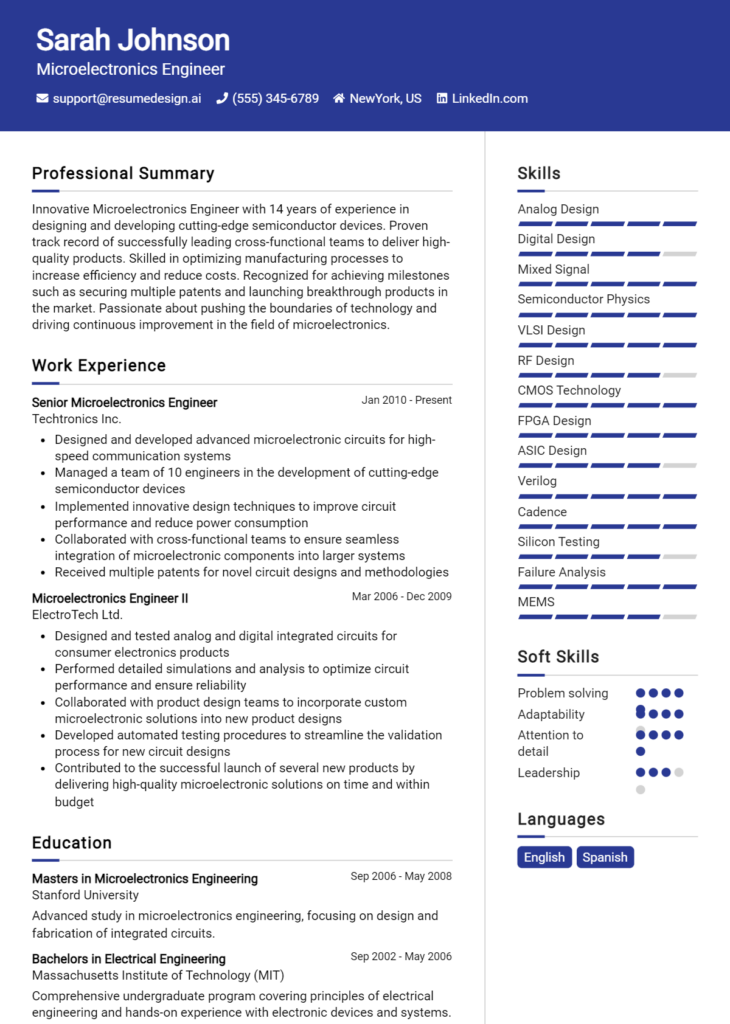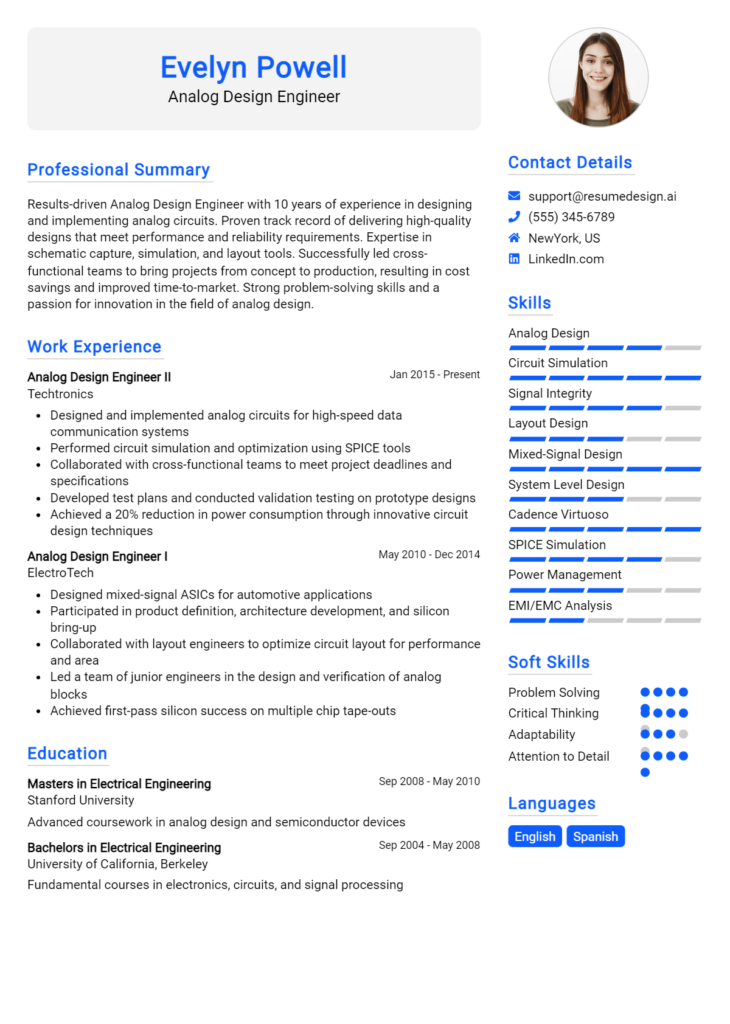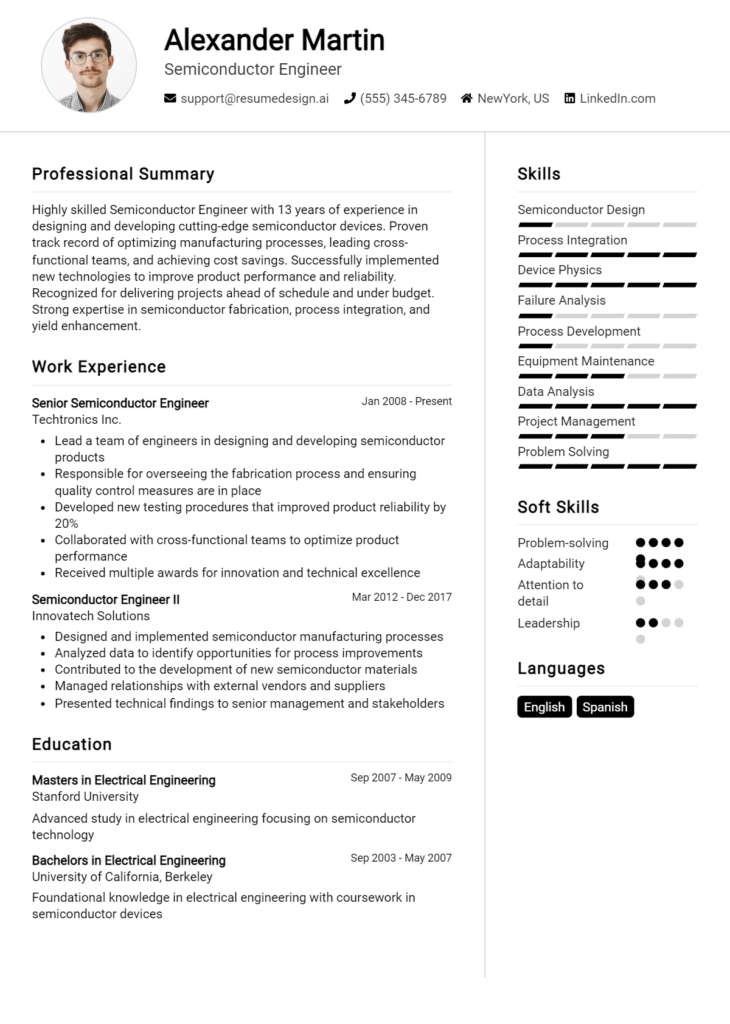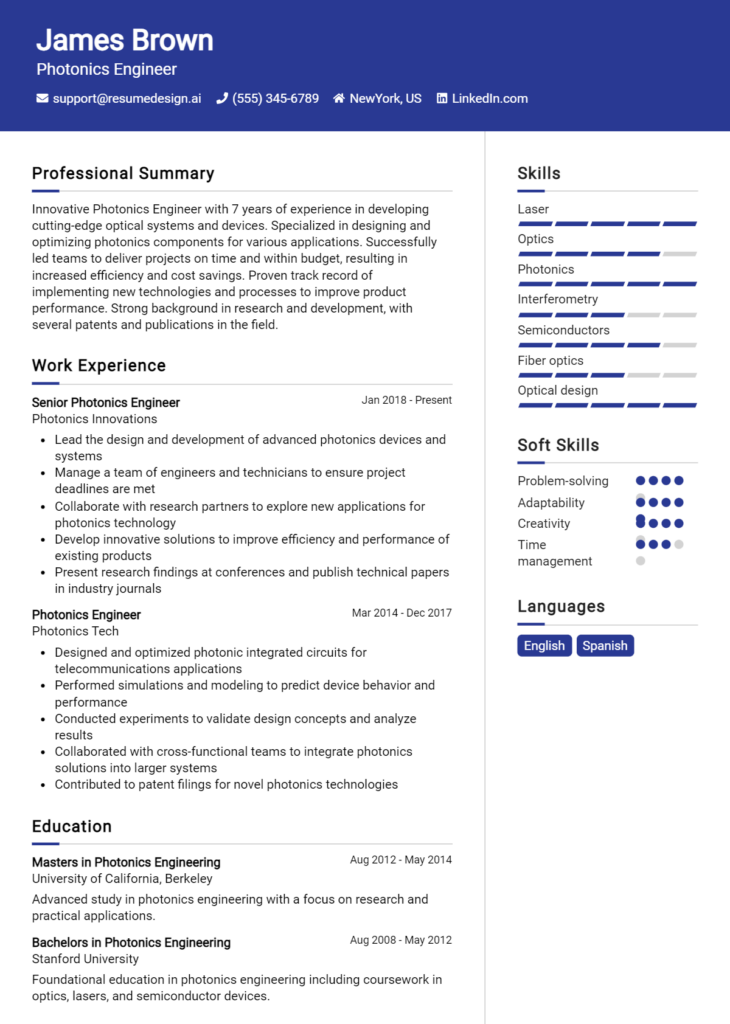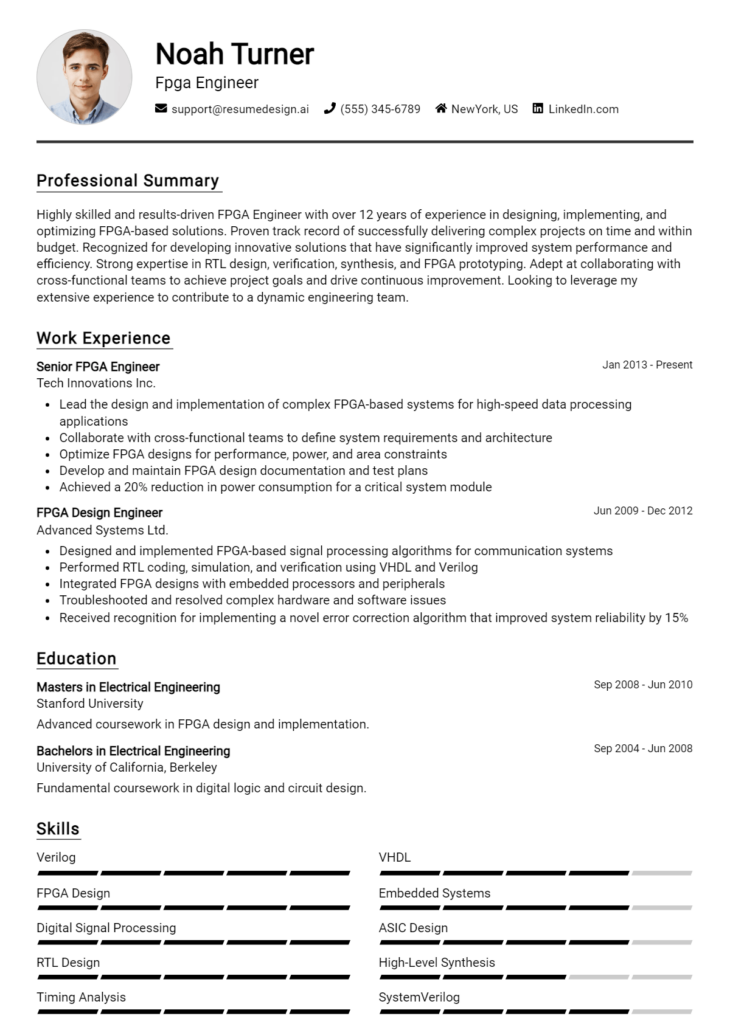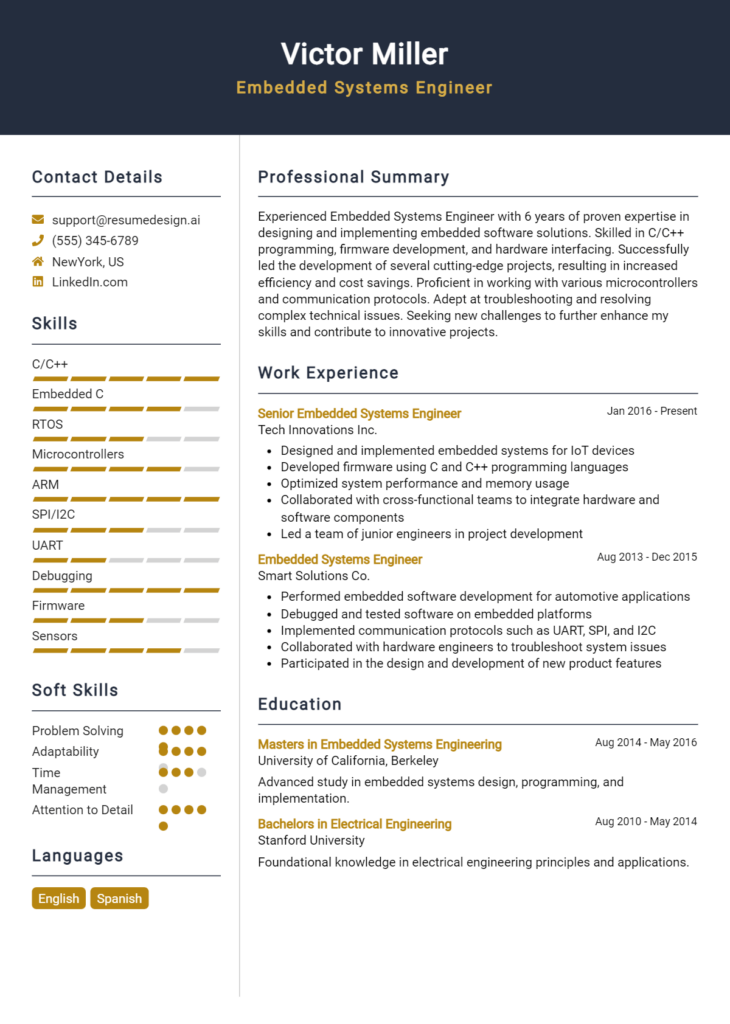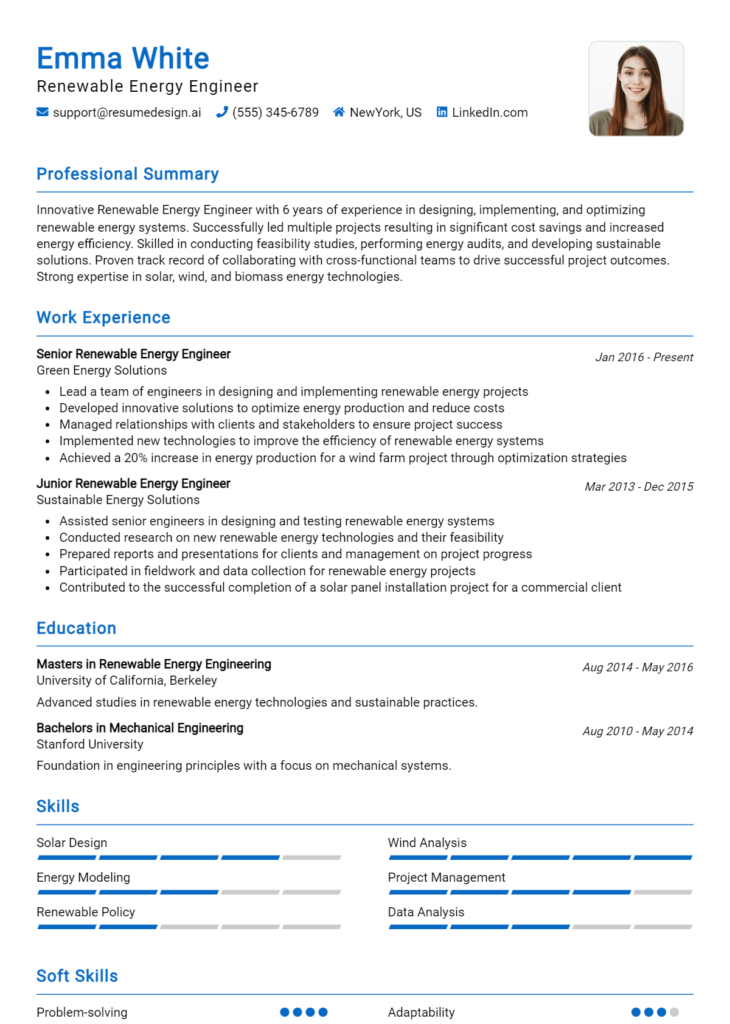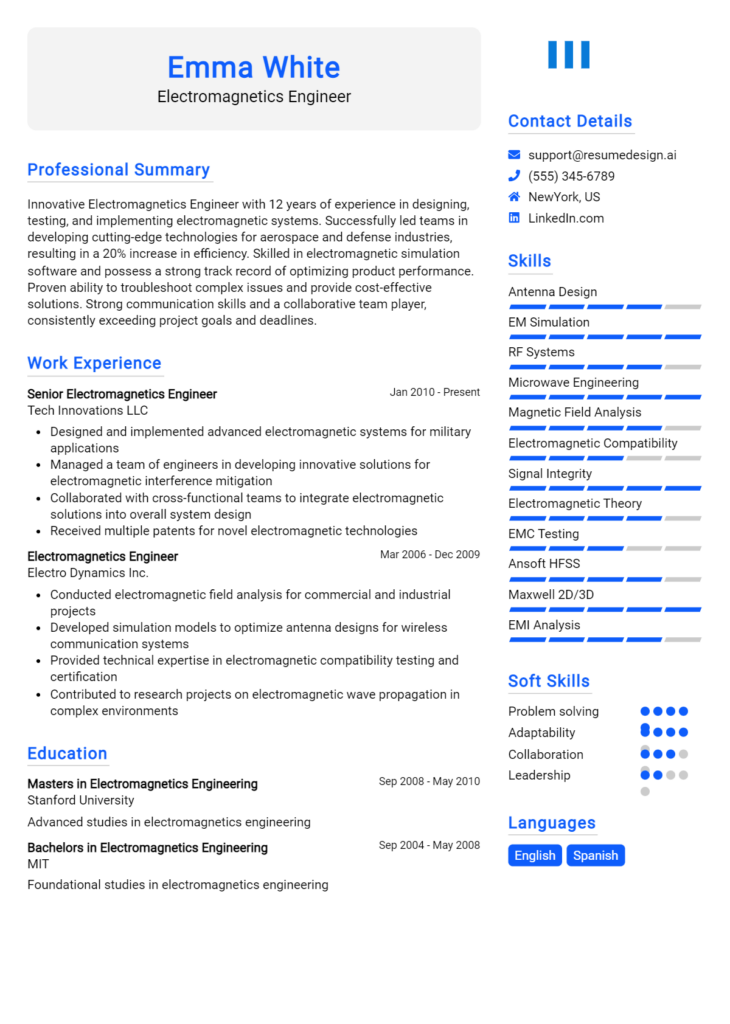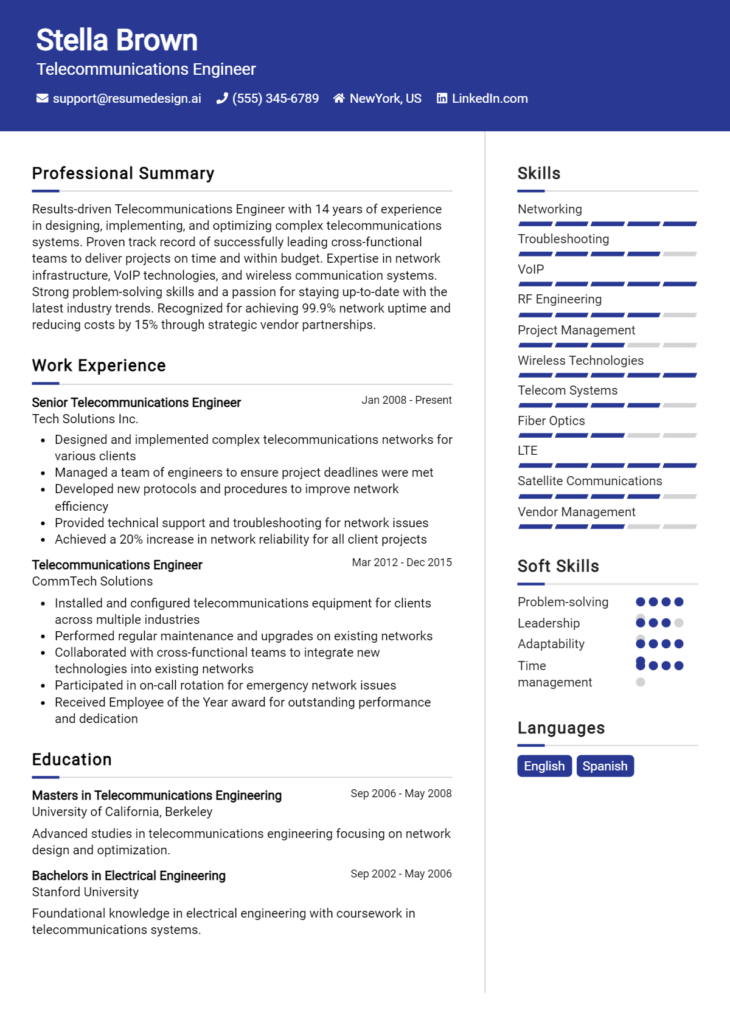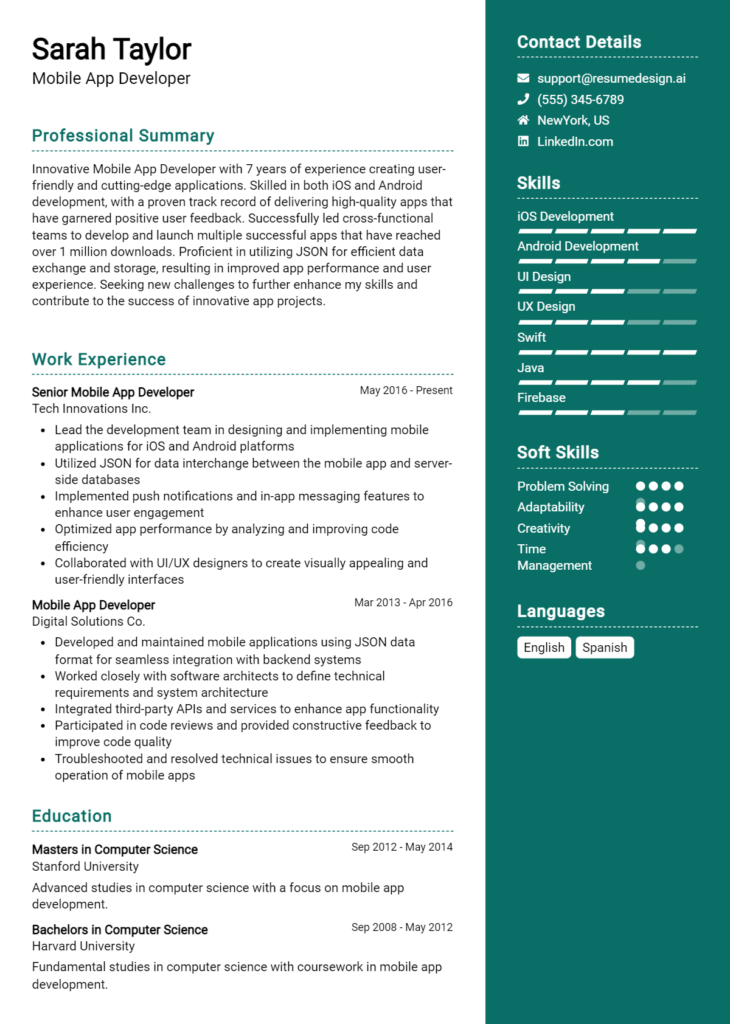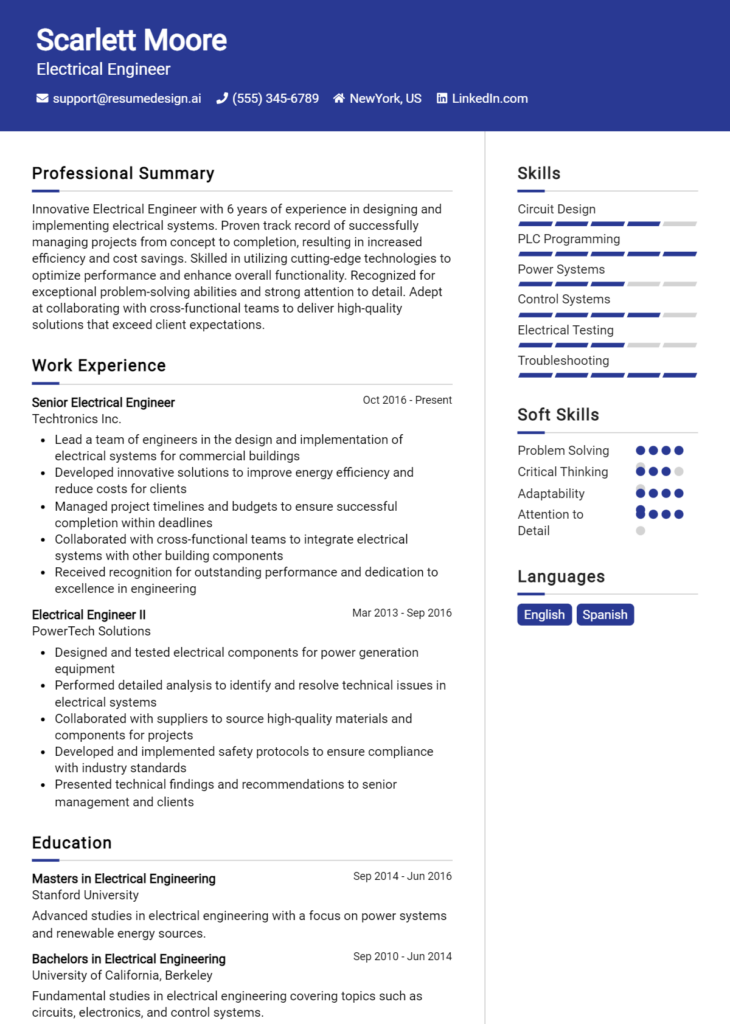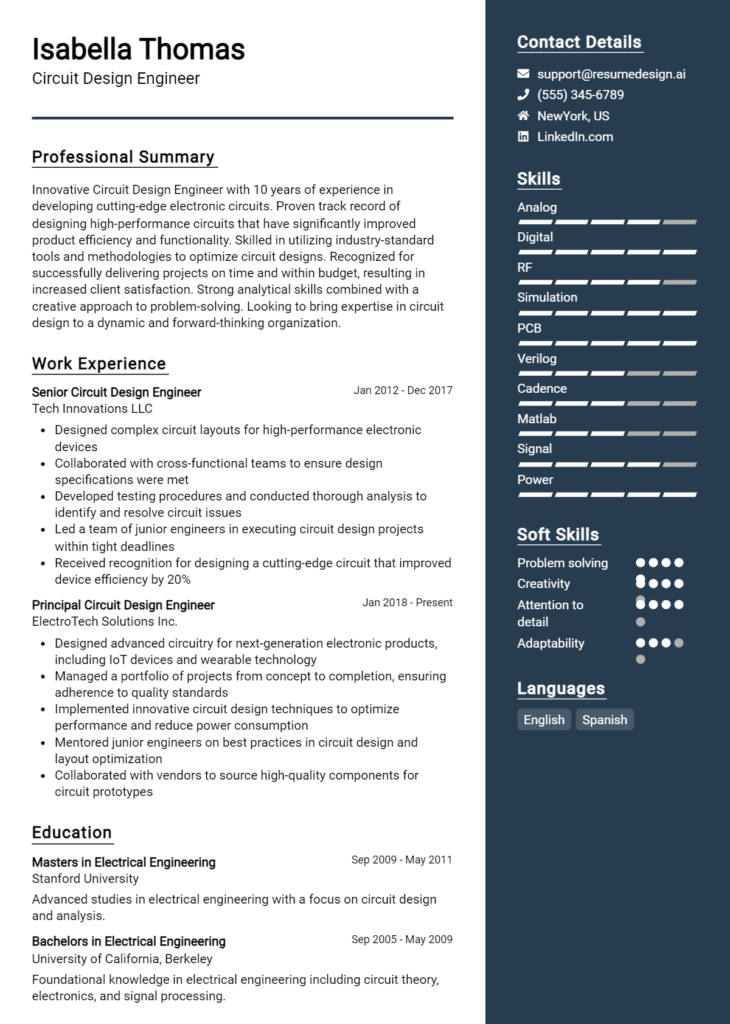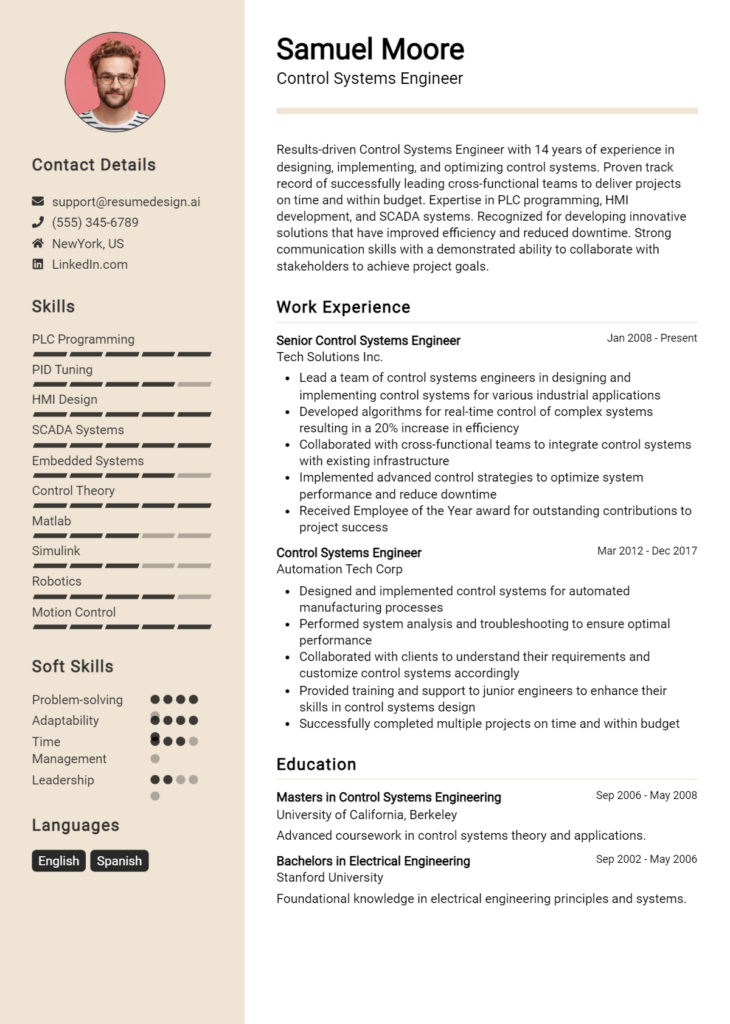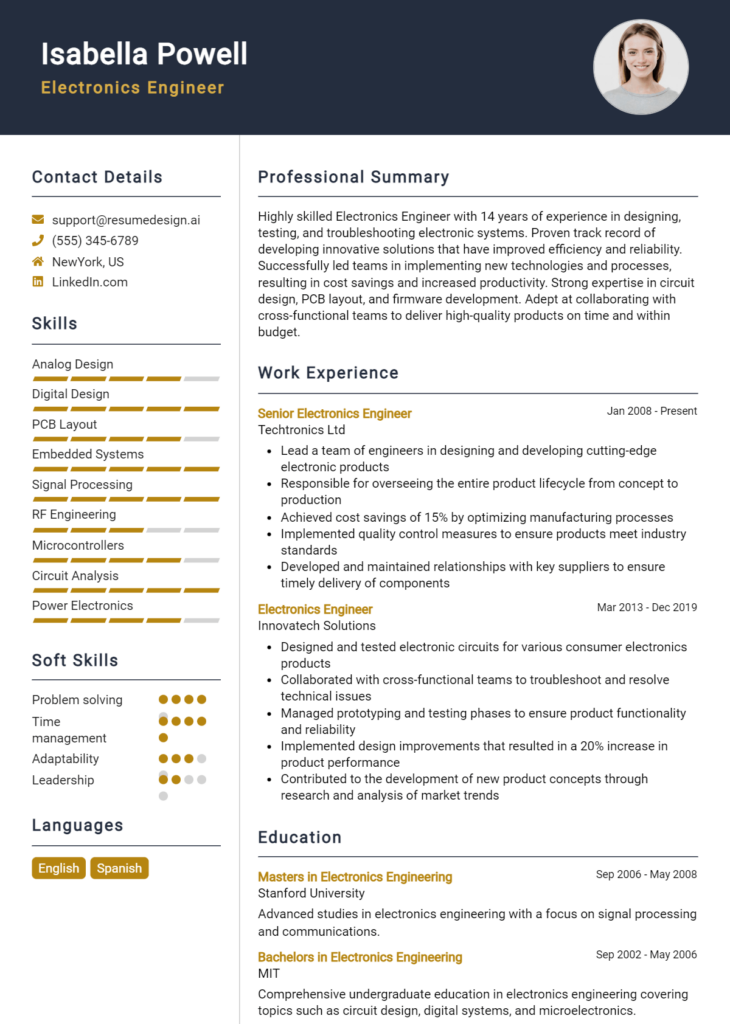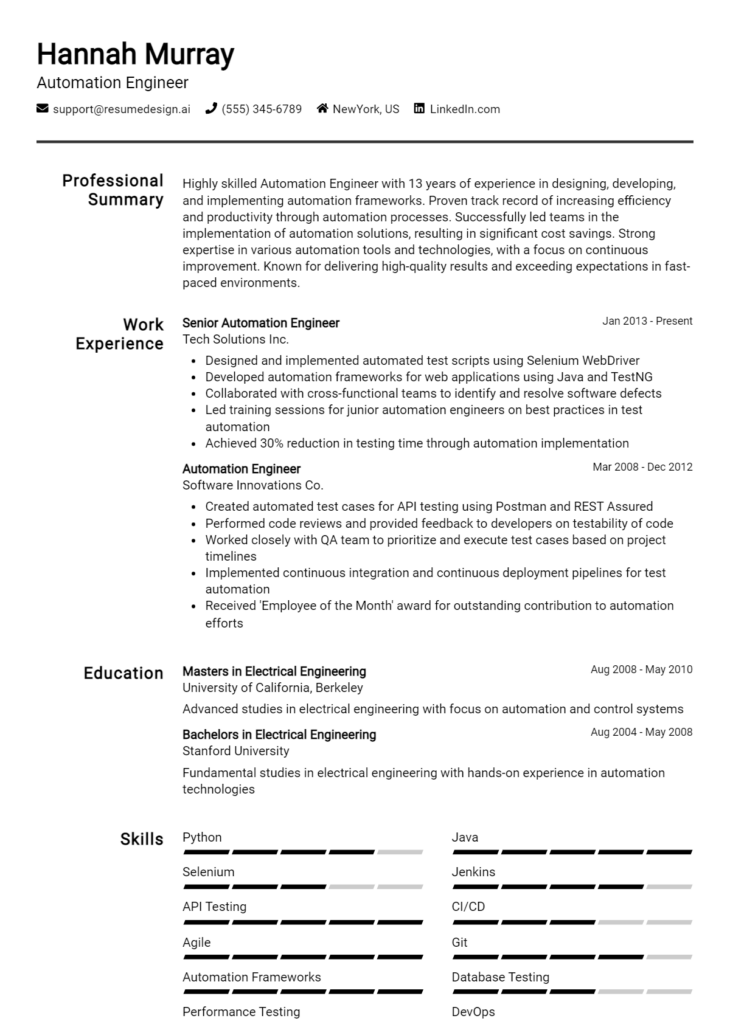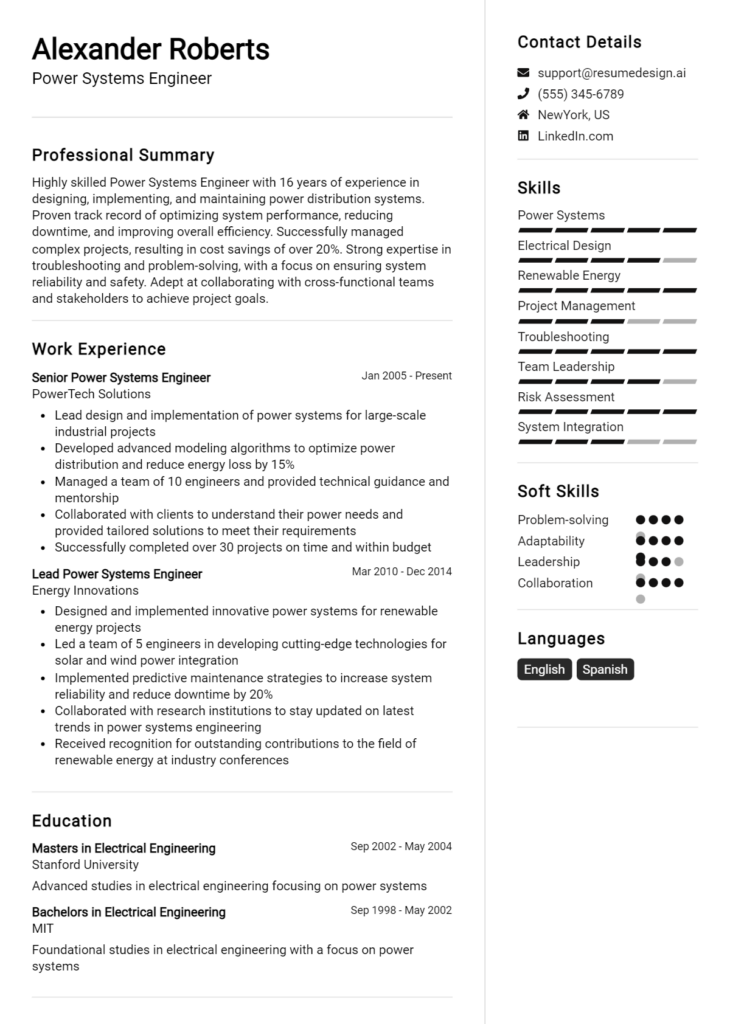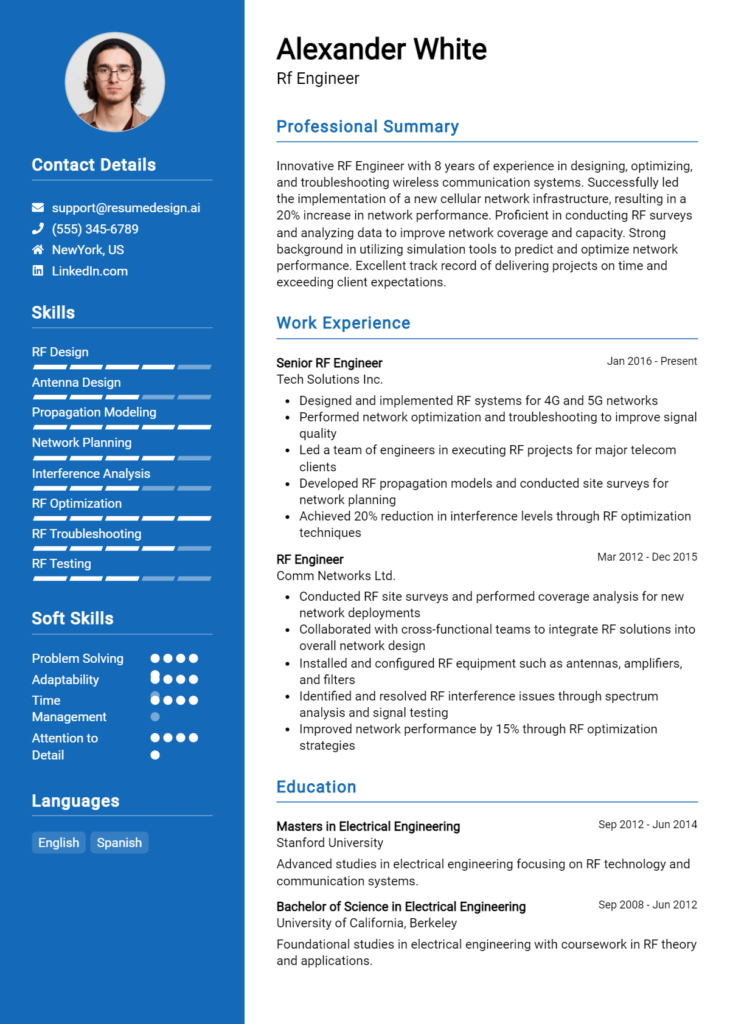Instrumentation Engineer Core Responsibilities
An Instrumentation Engineer plays a crucial role in designing, developing, and maintaining instrumentation systems that monitor and control processes across various industries. This role requires strong technical skills in electronics and programming, along with operational expertise to ensure systems function efficiently. Problem-solving abilities are vital for troubleshooting issues. By bridging gaps between engineering, operations, and management, an Instrumentation Engineer contributes significantly to organizational goals. A well-structured resume effectively showcases these vital qualifications, enhancing career prospects.
Common Responsibilities Listed on Instrumentation Engineer Resume
- Design and develop instrumentation systems for process monitoring and control.
- Calibrate and maintain measurement and control instruments.
- Collaborate with cross-functional teams to optimize processes.
- Conduct risk assessments and ensure compliance with safety standards.
- Troubleshoot instrumentation issues and implement solutions.
- Prepare technical documentation and reports for projects.
- Evaluate new technologies for potential integration.
- Train and support operational staff on instrumentation systems.
- Oversee installation and commissioning of instrumentation equipment.
- Manage project timelines and budgets effectively.
- Perform regular audits and maintenance to ensure system reliability.
High-Level Resume Tips for Instrumentation Engineer Professionals
In the competitive field of instrumentation engineering, a well-crafted resume serves as your first point of contact with potential employers. It is crucial for showcasing your skills, qualifications, and achievements in a manner that resonates with hiring managers. A carefully designed resume not only highlights your technical expertise but also reflects your ability to contribute effectively to projects and teams. This guide will provide practical and actionable resume tips specifically tailored for Instrumentation Engineer professionals, ensuring that your resume stands out in a crowded job market.
Top Resume Tips for Instrumentation Engineer Professionals
- Tailor your resume to each job description by incorporating relevant keywords and phrases that match the requirements.
- Highlight your technical skills, such as familiarity with specific instrumentation software, control systems, and relevant programming languages.
- Quantify your achievements by using metrics and data to demonstrate the impact of your work, such as improvements in efficiency or cost reductions.
- Include a summary statement at the top of your resume that succinctly outlines your experience and career goals.
- Showcase projects you've worked on, emphasizing your role, the technologies used, and the outcomes achieved.
- List certifications and licenses relevant to instrumentation engineering to establish your credibility and commitment to the profession.
- Focus on your problem-solving skills and ability to work collaboratively in multidisciplinary teams.
- Keep the format clean and professional, utilizing bullet points for clarity and ensuring that it is easy to read.
- Provide a section for continuous learning or professional development, including workshops, seminars, and courses taken.
By implementing these tips, you can significantly enhance the effectiveness of your resume, thereby increasing your chances of landing a job in the instrumentation engineering field. A well-structured and targeted resume not only showcases your qualifications but also demonstrates your commitment to the profession and your readiness to take on new challenges.
Why Resume Headlines & Titles are Important for Instrumentation Engineer
In the competitive field of instrumentation engineering, a well-crafted resume headline or title is essential. It serves as the first impression for hiring managers, providing a quick snapshot of a candidate's key qualifications and expertise. A strong headline can immediately grab attention, summarizing critical information in a concise and impactful phrase. When tailored to the job being applied for, these headlines can effectively communicate relevance and set the tone for the rest of the resume. A focused and direct title not only highlights the candidate’s strengths but also increases the chances of making it past initial screenings.
Best Practices for Crafting Resume Headlines for Instrumentation Engineer
- Be concise: Keep the headline short and to the point.
- Use specific terminology: Incorporate industry-related keywords relevant to instrumentation engineering.
- Highlight key skills: Focus on the most important skills that align with the job requirements.
- Showcase experience: Include years of experience or notable achievements that set you apart.
- Be role-specific: Tailor your headline to the particular position you are applying for.
- Avoid jargon: Use clear language that can be easily understood by any hiring manager.
- Incorporate certifications: Mention relevant certifications or licenses that add value to your profile.
- Keep it professional: Ensure the tone and wording reflect professionalism and expertise.
Example Resume Headlines for Instrumentation Engineer
Strong Resume Headlines
Experienced Instrumentation Engineer Specializing in Automation and Control Systems
Detail-Oriented Instrumentation Engineer with 5+ Years in Process Optimization
Certified Instrumentation Engineer with Proven Success in Project Management and Compliance
Weak Resume Headlines
Engineer with Experience
Instrumentation Specialist Seeking Opportunities
The strong resume headlines are effective because they immediately convey the candidate’s expertise, experience, and specific skills that align with the job description, making them memorable and relevant. In contrast, the weak headlines fail to impress due to their vagueness and lack of specificity, which do not provide hiring managers with a clear understanding of the candidate’s qualifications and potential contributions to the role. A compelling headline can significantly enhance a resume’s impact and increase the likelihood of securing an interview.
Writing an Exceptional Instrumentation Engineer Resume Summary
A well-crafted resume summary is crucial for an Instrumentation Engineer as it serves as the first impression for hiring managers. In a competitive job market, a strong summary quickly captures attention by showcasing key skills, relevant experience, and notable accomplishments that align with the specific job role. It should be concise, impactful, and tailored to the job description, ensuring that it highlights the candidate’s qualifications in a way that resonates with potential employers.
Best Practices for Writing a Instrumentation Engineer Resume Summary
- Quantify Achievements: Use specific numbers and metrics to illustrate your impact, such as cost savings, efficiency improvements, or project completion times.
- Focus on Key Skills: Highlight technical skills relevant to instrumentation engineering, such as proficiency in software tools, knowledge of industry standards, and expertise in specific instrumentation technologies.
- Tailor for the Job Description: Customize your summary for each position by incorporating keywords and phrases from the job listing to demonstrate relevance.
- Be Concise: Aim for 3-5 sentences that succinctly convey your qualifications without unnecessary detail.
- Showcase Relevant Experience: Briefly mention previous roles or projects that directly relate to the job you’re applying for.
- Include Certifications: If applicable, mention any relevant certifications or licenses that enhance your credibility as an instrumentation engineer.
- Highlight Problem-Solving Skills: Emphasize your ability to troubleshoot and resolve complex issues, which is critical in instrumentation engineering.
- Use Action Verbs: Start sentences with strong action verbs to convey a sense of proactivity and effectiveness.
Example Instrumentation Engineer Resume Summaries
Strong Resume Summaries
Results-driven Instrumentation Engineer with over 7 years of experience in designing and implementing automated control systems, leading to a 30% reduction in operational costs for multiple projects. Proficient in the latest instrumentation technology, including PLCs and SCADA, with a proven track record of enhancing system reliability and performance.
Detail-oriented Instrumentation Engineer with extensive expertise in process control and instrumentation design. Successfully managed a $2M instrumentation upgrade project that improved production efficiency by 25%. Certified in Six Sigma methodologies, ensuring quality and consistency in engineering solutions.
Dynamic Instrumentation Engineer with a solid background in designing and maintaining instrumentation systems for the oil and gas sector. Played a crucial role in a team that reduced equipment downtime by 40% through effective monitoring and maintenance strategies.
Weak Resume Summaries
Instrumentation Engineer with some experience in the field. I am looking for a job where I can use my skills.
Experienced engineer seeking opportunities in instrumentation. I have worked on various projects and am familiar with many tools and technologies.
The strong resume summaries stand out because they provide specific achievements, quantify results, and demonstrate a clear relevance to the role through targeted skills and experiences. In contrast, the weak summaries lack detail and specificity, making them too generic and uninspiring, which can fail to capture the attention of hiring managers.
Work Experience Section for Instrumentation Engineer Resume
The work experience section of an Instrumentation Engineer resume is pivotal in showcasing the candidate's technical skills and expertise in the field. This section provides potential employers with insight into the engineer's practical experience, illustrating their ability to manage teams effectively and deliver high-quality products. By quantifying achievements and aligning their experience with industry standards, candidates can significantly enhance their appeal, demonstrating not only their technical proficiency but also their capacity to drive results in real-world scenarios.
Best Practices for Instrumentation Engineer Work Experience
- Highlight specific technical skills relevant to instrumentation engineering, such as PLC programming, system design, and instrumentation calibration.
- Quantify achievements with metrics, such as percentage improvements in efficiency, cost savings, or successful project completions.
- Showcase leadership and collaboration by detailing experiences in managing teams or working cross-functionally with other departments.
- Use industry-standard terminology and frameworks to align your experience with current engineering practices.
- Include relevant projects that demonstrate your ability to solve complex problems and deliver innovative solutions.
- Focus on outcomes and impacts of your work, rather than just responsibilities or tasks.
- Tailor descriptions of experiences to match the job description of the position you are applying for.
- Keep the format clear and concise to ensure easy readability for hiring managers.
Example Work Experiences for Instrumentation Engineer
Strong Experiences
- Led a team of 5 engineers in the successful design and implementation of a new PLC-based control system, resulting in a 30% reduction in operational downtime.
- Managed the calibration and maintenance of over 200 instruments, achieving a 98% compliance rate with industry standards and improving data accuracy.
- Developed a predictive maintenance program that decreased equipment failure rates by 40%, directly contributing to overall cost savings of $150,000 annually.
- Collaborated with cross-functional teams to integrate new instrumentation technologies, enhancing system performance and driving a 25% increase in production efficiency.
Weak Experiences
- Worked on various projects related to instrumentation.
- Responsible for monitoring equipment and ensuring it was functioning properly.
- Assisted team members with their tasks on instrumentation-related issues.
- Participated in team meetings discussing project progress.
The examples provided illustrate the contrast between strong and weak experiences in the work history of an Instrumentation Engineer. Strong experiences are characterized by specific, quantifiable outcomes and demonstrate leadership and collaboration, reflecting the candidate's ability to deliver impactful results. In contrast, weak experiences lack detail and clarity, failing to convey the candidate's contributions or the significance of their work, which may leave hiring managers unimpressed.
Education and Certifications Section for Instrumentation Engineer Resume
The education and certifications section of an Instrumentation Engineer resume is crucial as it showcases the candidate's academic foundation and commitment to professional development. This section not only highlights relevant degrees and coursework but also emphasizes any industry-recognized certifications that validate the candidate's expertise in instrumentation engineering. By detailing specialized training and continuous learning efforts, this section significantly enhances the candidate's credibility, demonstrating alignment with the job requirements and a proactive approach to staying current in the field. Employers often look for these qualifications to gauge a candidate’s readiness for the complexities of modern instrumentation tasks.
Best Practices for Instrumentation Engineer Education and Certifications
- List the highest degree first, followed by relevant certifications.
- Include specific coursework that directly relates to instrumentation engineering.
- Highlight advanced degrees or specialized training in relevant technologies.
- Use clear and concise formatting for easy readability.
- Prioritize industry-recognized certifications, such as ISA or PMP.
- Update the section regularly to reflect any new qualifications or skills.
- Consider including relevant workshops or seminars attended.
- Provide dates for all educational achievements and certifications to show currency.
Example Education and Certifications for Instrumentation Engineer
Strong Examples
- Bachelor of Science in Instrumentation Engineering, ABC University, Graduated May 2020
- Certified Automation Professional (CAP), International Society of Automation, 2022
- Relevant Coursework: Process Control Systems, Sensors and Transducers, Control Theory
- Advanced Certificate in Industrial Automation, XYZ Technical Institute, 2021
Weak Examples
- Associate Degree in General Studies, DEF Community College, Graduated 2018
- Certification in Basic Computer Skills, 2020
- Online Course in Personal Finance, 2021
- High School Diploma, GHI High School, Graduated 2016
The strong examples are considered effective as they directly relate to the requirements of an Instrumentation Engineer, showcasing relevant degrees and certifications that demonstrate both knowledge and ongoing professional development in the field. In contrast, the weak examples lack relevance and do not contribute to a strong profile as an instrumentation engineer, highlighting qualifications that are either outdated or unrelated to the technical skills required in the industry.
Top Skills & Keywords for Instrumentation Engineer Resume
As an Instrumentation Engineer, showcasing your skills on your resume is crucial for standing out in a competitive job market. Employers seek candidates who not only possess the technical know-how but also exhibit the soft skills necessary for teamwork and effective communication. A well-rounded skill set demonstrates your ability to tackle complex challenges, collaborate with multidisciplinary teams, and contribute to the overall success of engineering projects. By highlighting both hard and soft skills, you can create a compelling resume that resonates with hiring managers and aligns with the specific demands of the role.
Top Hard & Soft Skills for Instrumentation Engineer
Soft Skills
- Problem-solving
- Team collaboration
- Attention to detail
- Effective communication
- Time management
- Adaptability
- Critical thinking
- Project management
- Creativity
- Leadership
Hard Skills
- Knowledge of instrumentation systems
- Proficiency in control systems design
- Familiarity with PLC programming
- Experience with SCADA systems
- Understanding of process control theory
- Competence in data analysis and interpretation
- Knowledge of industry standards (e.g., ISA, ISO)
- Experience with calibration and validation
- Proficiency in CAD software
- Understanding of safety regulations and compliance
Incorporating these essential skills into your resume, along with relevant work experience, will significantly enhance your profile and increase your chances of securing an interview.
Stand Out with a Winning Instrumentation Engineer Cover Letter
Dear [Hiring Manager's Name],
I am writing to express my interest in the Instrumentation Engineer position at [Company Name], as advertised on [where you found the job listing]. With a Bachelor’s degree in Instrumentation Engineering and over [X years] of hands-on experience in designing, developing, and maintaining complex instrumentation systems, I am confident in my ability to contribute effectively to your team. My background in [specific area of expertise, e.g., process control, automation, or instrumentation design] has equipped me with a strong foundation in both theoretical knowledge and practical application.
In my previous role at [Previous Company Name], I successfully led a team in the design and implementation of a state-of-the-art control system that improved process efficiency by [specific percentage or result]. My experience with [specific tools or technologies, e.g., PLCs, DCS, SCADA systems] has enabled me to optimize performance and ensure compliance with industry standards. I am adept at troubleshooting complex systems, and my attention to detail allows me to identify potential issues before they escalate, ensuring minimal downtime and maximum productivity.
Collaboration is key in engineering, and I pride myself on my ability to work effectively within multidisciplinary teams. I have a proven track record of liaising with mechanical, electrical, and software engineers to deliver integrated solutions that meet project requirements and timelines. Additionally, my strong communication skills enable me to convey technical concepts clearly to non-technical stakeholders, facilitating collaboration and driving project success.
I am excited about the opportunity to bring my unique skills and experience to [Company Name] and contribute to your ambitious projects. Thank you for considering my application. I look forward to the possibility of discussing how I can help advance your instrumentation initiatives and support your commitment to excellence.
Sincerely,
[Your Name]
[Your LinkedIn Profile or Contact Information]
Common Mistakes to Avoid in a Instrumentation Engineer Resume
When crafting a resume for an Instrumentation Engineer position, it's crucial to present your skills and experiences effectively to stand out in a competitive job market. However, many applicants fall into common traps that can undermine their chances of landing an interview. Avoiding these pitfalls can significantly enhance the impact of your resume and showcase your qualifications in the best light. Here are some common mistakes to steer clear of:
Using a Generic Template: Many candidates rely on one-size-fits-all templates that lack personalization. Tailoring your resume to highlight relevant skills and experiences specific to instrumentation engineering is essential.
Neglecting Technical Skills: Instrumentation engineering requires a solid foundation in specific technical skills. Failing to list relevant tools, software, and methodologies can leave potential employers questioning your expertise.
Vague Job Descriptions: Simply listing job titles and duties without providing specific accomplishments or contributions can make your resume forgettable. Use quantifiable achievements to demonstrate your impact in previous roles.
Omitting Certifications and Licenses: Certifications such as Certified Automation Professional (CAP) or Professional Engineer (PE) can set you apart from other candidates. Ensure these credentials are prominently displayed on your resume.
Ignoring Industry Keywords: Many employers use Applicant Tracking Systems (ATS) to filter resumes. Not incorporating industry-specific keywords related to instrumentation engineering could result in your resume being overlooked.
Inconsistent Formatting: A cluttered or inconsistent format can distract from your qualifications. Use uniform fonts, sizes, and spacing to create a professional appearance that is easy to read.
Overloading with Irrelevant Information: Including unrelated work experiences or excessive personal information can dilute the focus of your resume. Stick to experiences that showcase your qualifications for the instrumentation engineering role.
Failing to Proofread: Grammatical errors or typos can create a negative impression and suggest a lack of attention to detail. Always proofread your resume or have someone else review it before submission.
Conclusion
As an Instrumentation Engineer, your expertise in designing, developing, and maintaining instrumentation systems is crucial in various industries, from manufacturing to aerospace. Key responsibilities include ensuring compliance with safety and quality standards, conducting system tests, and collaborating with multidisciplinary teams to optimize processes. Staying updated with the latest technologies and regulations is essential for success in this dynamic field.
In summary, it’s vital to present your skills and experiences effectively in your resume. Highlight your technical abilities, project management experience, and any relevant certifications. A well-crafted resume can significantly enhance your chances of landing your desired position.
To take the next step in advancing your career, we encourage you to review your Instrumentation Engineer resume. Utilize the available resources to improve your application materials:
- Check out our resume templates to find a design that suits your professional style.
- Use our resume builder to create a polished and professional resume quickly.
- Explore resume examples that showcase successful instrumentation engineers' profiles for inspiration.
- Don’t forget to craft a compelling introduction with our cover letter templates.
Taking advantage of these tools can help you stand out in the competitive job market. Start refining your resume today!

